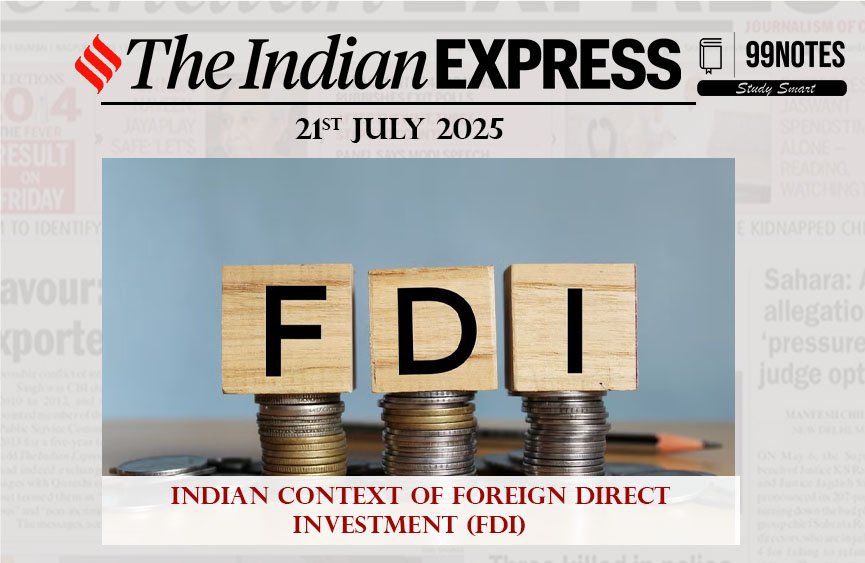26 July 2025: Indian Express Editorial Analysis
1. Missing In Manipur
(Source: Editorial Page, The Indian Express)
| Topic: GS Papers: GS2 (Polity & Governance), GS1 (Society, Post-independence consolidation), GS4 (Ethics in Governance) |
| Context |
|
Background
-
There has been a continued governance deficit in Manipur, with extended President’s Rule failing to resolve political and ethnic unrest.
-
Manipur’s situation escalated after the resignation of the Chief Minister, and the Centre’s intervention has not led to any political solution, leaving the state in limbo.
The Problem of President’s Rule
-
President’s Rule, intended as a temporary provision under Article 356, has been extended due to the state’s persistent strife and governance challenges.
-
The frequent and prolonged use of Central rule raises concerns about federalism, democratic norms, and accountability in conflict-ridden states.
Consequences of Governance Deficit
-
Absence of an elected government leads to inefficient administration, lack of accountability, and public distrust.
-
Humanitarian issues, such as prolonged violence and displacement, remain unaddressed due to lack of decisive political leadership.
Federalism and Democratic Ethos
-
The editorial argues that postponing the restoration of an elected government undermines the spirit of cooperative federalism.
-
Governance through a ‘remote-controlled’ administration is inadequate for handling complex socio-political issues in a sensitive region like the Northeast.
Ethnic Conflict and Policy Paralysis
-
Ethnic tensions between communities have been aggravated by administrative indecision and lack of political dialogue.
-
With Lok Sabha elections over and no immediate pressure from the Centre, there is an urgent need for meaningful reconciliation and engagement with stakeholders.
Way Forward / Conclusion
-
Restoration of a popular, representative government is essential for peace-building and confidence restoration in Manipur.
-
The Centre must prioritize dialogue with all stakeholders, facilitate elections, and ensure that constitutional solutions are not subverted for administrative convenience.
-
Lasting solutions require ethical and inclusive governance, reinforcing faith in India’s democratic process and constitutional values.
| Practice Question: (GS-2 | 15 Marks | 250 Words)
Critically analyze the impact of prolonged President’s Rule on governance and democratic processes in conflict-prone states like Manipur. Discuss the constitutional safeguards and suggest measures to restore democratic normalcy while ensuring effective administration. |
Also Read: The Hindu Editorial Analysis- 26 July 2025
2. More Than A Trade Pact
(Source: Editorial Page, The Indian Express)
| Topic: GS2 (International Relations, Bilateral Agreements, India and international organizations), GS3 (Indian Economy, Industrial Policies, Growth & Development, Globalization) |
| Context |
|
Background & Significance
-
India and the UK have been actively negotiating a Free Trade Agreement aimed at strengthening economic and strategic ties, with talks reflecting both nations’ search for international relevance—UK post-Brexit and India as a manufacturing and services hub.
-
The FTA is viewed as symbolic of broader geopolitical aspirations, not just tariff reduction.
Unpacking the India-UK FTA
-
Seeks to expand bilateral trade across goods, services, investments, technology, and mobility.
-
Goes beyond mere tariff elimination to address regulatory coherence, digital economies, and cooperation in sectors like education and professional services.
Strategic Context
For the UK:
- The FTA is integral to its “Global Britain” narrative, diversifying trade relationships after leaving the European Union.
- Hopes to tap into India’s large market, skilled labor pool, and innovation ecosystem.
For India:
- Aligns with “Make in India for the World,” aiming to bolster exports, attract investment, and expedite integration with global value chains.
- Sees the FTA as a tool for economic reform and modernization, especially in sectors like manufacturing, textiles, and IT.
Opportunities and Challenges
Opportunities:
- Increased market access for Indian goods and services, particularly textiles, agri-products, IT, and pharmaceuticals.
- Greater investment opportunities and job creation in both nations.
- Enhanced collaboration in education, research, climate action, and startup ecosystems.
Challenges:
- Concerns around non-tariff barriers, intellectual property rights, and regulatory standards.
- Potential sensitivities regarding mobility of professionals, data security, and protectionist tendencies.
The Broader Impact
-
Sets a benchmark for India’s future trade negotiations with developed countries.
-
May serve as a model for balancing growth with inclusiveness, setting standards for climate responsibility, labor, and sustainability.
-
Strengthens India’s bargaining power within global forums and supports its vision of becoming a global economic powerhouse.
Way Forward / Conclusion
-
The success of the India-UK FTA depends on the ability to reconcile divergent interests, streamline processes, and ensure equitable gains.
-
Policymakers should ensure the agreement remains flexible and adaptable to changing global economic realities.
-
For UPSC aspirants, the editorial underlines the importance of trade diplomacy and its linkages with domestic development—issues central to both economy and international relations papers.
|
Practice Question: (GS-2 | 10 Marks | 150 Words) |
Read more – 25 July 2025 : Indian Express Editorial Analysis



